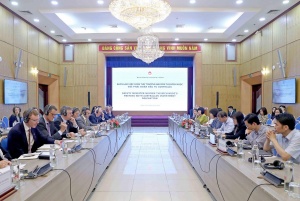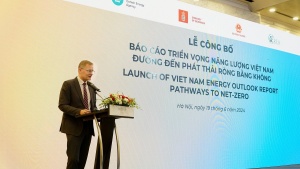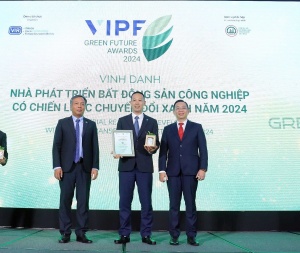Ride-hailing companies gear up for the green transition
In August, Dien Bien Green Taxi (under Phan Hai 89 Co., Ltd.) signed a contract to purchase and lease 300 electric cars from Vingroup’s Green and Smart Mobility (GSM). The agreement brings the implementation of an electric taxi service into the markets of the northern provinces of Dien Bien and Lai Chau.
 |
| Ride-hailing companies gear up for the green transition, illustration photo |
All cars delivered to Dien Bien Green Taxi will be the VF5 Plus, an economical electric vehicle (EV) model for the passenger transport business. This conversion not only helps to reduce air and noise pollution but also brings economic efficiency by saving up to 30 per cent of fuel and vehicle operating costs.
Tran Thanh Quan, director of Phan Hai 89, said, “Dien Bien Green Taxi will join GSM to bring green vehicles closer to the local driver and customer community, popularise convenient travel experiences, and raise awareness in rural and mountainous areas about environmental protection. Hopefully, with the development of Dien Bien Green Taxi, we will witness positive changes in transportation in the northwestern provinces.”
Nearly two years after GSM launched in Vietnam, the green taxi brand is present in 55 cities and provinces, including Dien Bien and Lai Chau. Around a dozen businesses and partners are cooperating with GSM to switch to EVs, continuously expanding the electric taxi network of brands across the country.
The government has outlined the goal of having half of public transport vehicles become electric by 2030, and achieving 100 per cent of EVs by 2050. In this context, GSM’s establishment aligns with the nation’s vision and strategy and cannot deviate from it, according to Nguyen Van Thanh, CEO of GSM.
“From the outset, GSM has positioned its brand as a pioneering step in green transportation, in line with global trends and the Vietnamese government’s commitment to net-zero by 2050,” Thanh said. “GSM aims to create substantial value for customers and partners. Therefore, after one year of operation, we have more than 33 partners, and 50,000 EVs across 40 cities and provinces.”
Regarding environmental impact, GSM has helped reduce 52 million kilogrammes of CO2, equivalent to a forest of 860 hectares, with 2.6 million photosynthesising trees within a year. “Vietnamese people are very concerned about the environment. Evidence of this is that in just one year, GSM has served 50 million customer trips, an impressive number for a startup in the EV sector. Additionally, foreigners are interested in environmental issues and strongly support GSM. We have received many positive reviews from international tourists using our services for their trips,” Thanh emphasised.
He assesses the EV market as highly promising and forecasts that it will continue to grow at this rate for over 20 years.
GSM aims not only to expand within Vietnam, but also to enter other countries. In the next two years, GSM plans to be present in seven international markets.
Last year, Be Group and GSM signed an agreement to bring EVs and motorbikes into operation in transport services in Vietnam. Under the deal, Be Group will receive direct investment from GSM to become a multiservice consumer platform and provide a modern tech transportation service in the country.
Through financial partners, GSM will also support Be’s drivers to switch from petrol vehicles to EVs. In the first phase of the cooperation, the two will partner with VPBank to offer exclusive policy deals to Be drivers to rent or purchase VinFast EVs and motorbikes.
Meanwhile, as Vietnam gradually embraces the era of EVs, Grab Vietnam is implementing a series of pilot programmes to thoroughly evaluate the advantages and challenges associated with utilising environmentally friendly transport.
“Collaboration with EV manufacturers and partners to enhance the experience of our esteemed drivers is a pivotal facet of Grab’s strategic framework. Presently, Grab is engaging in pilot programmes with partners for the Grab Express service, meticulously devising comprehensive plans to find innovative ways to increase the adoption of EVs in our ecosystem,” CEO of Grab Vietnam Alejandro Osorio said. “Grab Vietnam is currently engrossed in an experimental phase of adoption, an integral component of our long-term strategy. This judicious approach enables Grab to amass invaluable data and fine-tune our plans to ensure a sustainable transition towards EVs.”
The Institute of Strategy and Policy on Natural Resources and Environment under the Ministry of Natural Resources and Environment stated that the government has introduced a policy to waive registration fees for battery EVs for three years to encourage the use of EVs and reduce air pollution and greenhouse gas emissions domestically. Additionally, in the following two years, the registration fee will be only half of the standard fee applied to petrol vehicles with similar seating capacity.
 | Australian firms show interest in Vietnam’s green transition Further cooperation and investment in science, technology, trade promotion, innovation, digitalisation, and the green transition were all topics that were discussed during an Australian business delegation's visit to the Ministry of Planning and Investment (MPI) on June 4. |
 | Investment in green energy transition vital for Vietnam The Vietnam Energy Outlook Report - Pathways to Net Zero (EOR-NZ) has noted that to achieve its 2050 target, Vietnam's CO2 emissions may peak by 2030, so the pace of its green energy transition needs to pick up. |
 | Green i-Park honoured for its green transformation strategies Green i-Park, the investor of Lien Ha Thai Industrial Park (Green iP1), has been praised for its green transformation strategies at the Vietnam Industrial Property Forum's special awards event. |
 | Green Energy Transition Showcase powers sustainable future The Asia Society for Social Improvement and Sustainable Transformation (ASSIST) on August 27 launched the Green Energy Transition Showcase with the theme Powering a Sustainable Future in Ho Chi Minh City. |
What the stars mean:
★ Poor ★ ★ Promising ★★★ Good ★★★★ Very good ★★★★★ Exceptional
Related Contents
Latest News
More News
- Masan Consumer names new deputy CEO to drive foods and beverages growth (February 23, 2026 | 20:52)
- Myriad risks ahead, but ones Vietnam can confront (February 20, 2026 | 15:02)
- Vietnam making the leap into AI and semiconductors (February 20, 2026 | 09:37)
- Funding must be activated for semiconductor success (February 20, 2026 | 09:20)
- Resilience as new benchmark for smarter infrastructure (February 19, 2026 | 20:35)
- A golden time to shine within ASEAN (February 19, 2026 | 20:22)
- Vietnam’s pivotal year for advancing sustainability (February 19, 2026 | 08:44)
- Strengthening the core role of industry and trade (February 19, 2026 | 08:35)
- Future orientations for healthcare improvements (February 19, 2026 | 08:29)
- Infrastructure orientations suitable for a new chapter (February 19, 2026 | 08:15)

 Tag:
Tag:


















 Mobile Version
Mobile Version